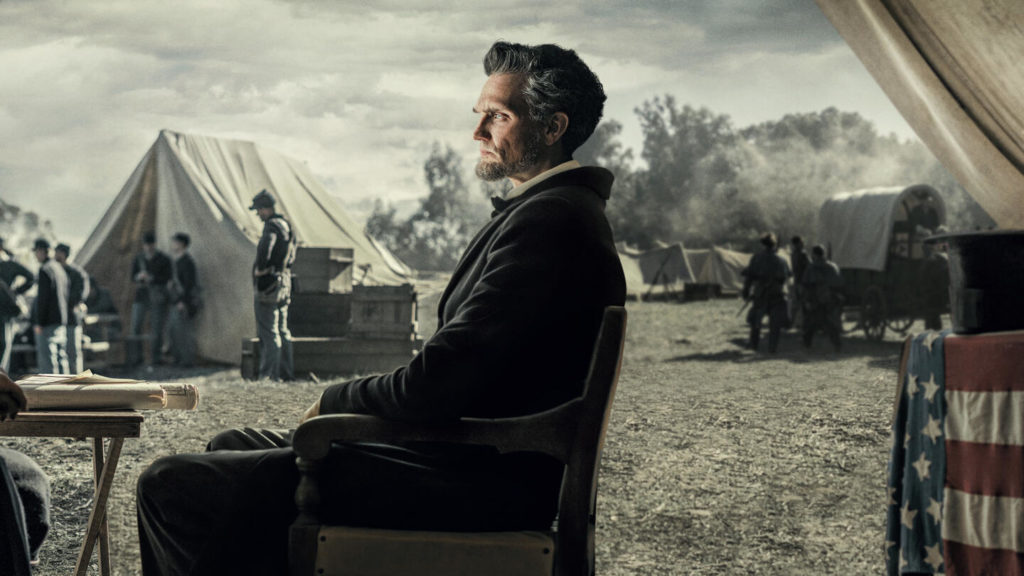You can’t ever learn too much about your Authority Archetype, and I try to follow everything I can about every Archetype because I help people adapt the strategies from these historical figures to become influential experts and Thought Leaders.
So you know I’d be glued to the television for the first installment of History’s 3-part Abraham Lincoln documentary.
Is it worth your time? Should you watch? Is it interesting and accurate? Let’s dive in and find out!
The show opens with young Abraham’s father nailing shut his wife’s casket. Abraham Lincoln is portrayed as a slightly sad but mostly confused little boy who is not getting much understanding or help from his gruff father.
That sets the tone for the first part documentary, which focuses on Lincoln’s youth and rise to political power, culminating with the South’s attack on Fort Sumter, kicking off the beginning of what will become a very bloody Civil War.
The structure of the documentary is part dramatization, part expert testimony, and a sprinkling of still pictures. Overall, the presentation is well done. Unlike some past History presentations, the dramatized bits weren’t terribly overplayed. I’m never happy with Lincoln impersonators, so I’m going to refrain from criticizing the work done here.
To the extent that History had to summarize 52 years of a man’s life as he went from dirt-poor child to President, they did a fair but not great job in the two and a half hours they had to work with. Everybody wants to know about inaccuracies, which were kept to a minimum, so I’ll mention a few, as well as a number of surprising omissions:
The boyhood cabin Lincoln lived in before his father brought home his new wife was likely far nicer than the real building. And I really abuse the meaning of the word “building” when I describe a structure with less than four walls.
Lincoln’s New Salem was depicted as a much larger town than it actually was, but it was nice to see the documentary spend as much time as they did in that portion of his life.
The documentary mostly skips over the atheism and depression that marked Lincoln’s early life, and completely ignores the life and role of Ann Rutledge. There is some question about what that role actually was, but that’s the kind of thing that can add interest to something like this.
Mary Lincoln is portrayed as a kind, even-keeled supporter of her husband, which isn’t quite accurate. She was a bit more, well, fiery than that. Lincoln stayed out on the road quite a bit as a lawyer, and at least part of the reason for that was that the Lincolns had, at times, quite a stormy relationship.
Additionally, the show depicts Abraham Lincoln being introduced to Mary by his later political rival Stephen Douglas. That Mary was Douglas’ serious boyfriend, if not fiancee, is glossed over.
Lincoln’s exit from Springfield was not portrayed, which seemed like a miss because he gave one of the most heartfelt speeches of his life at that moment.
I was gratified to see that the episode made much of the reasons for the division of the country and the reasons for succession. They delved into the “Lost Cause” distortion and did a good job of threading the needle of Lincoln’s evolving views of slavery.
I was happy to see so many people from the pinnacle of Lincoln scholarship represented in the first part of this documentary. Doris Kearns Goodwin, who also served as Executive Producer, is of course prominently featured, but she brought along quite a few notable Lincoln authors. We hear from (and I really hope I don’t leave anyone out) Ronald C. White, Howard Holzer, Ted Widmer, David Reynolds, and Allen Guelzo. I’m going to stop there, but there were solid and important contributions from several other academics. We did not see or hear from Michael Burlingame, who has the distinction of writing the most definitive Lincoln biography ever produced. You’d think he would have a lot of insight to offer, in contrast to the several appearances of President Barack Obama.
And that brings me to a major point of contention I have with the first episode.
When Obama first appeared on the screen, I had one of those “surprised-but-not-surprised” moments. I’m unhappy that the first episode of the series used him the same way they used other talking heads — to describe and explain aspects of Lincoln’s life which were not or could not be dramatized.
I was annoyed that Obama was taking screen time away from the actual experts. Making history, as Obama and all Presidents do, does not make you a historian any more than being sick makes you a doctor.
At the point in Lincoln’s life covered by the most of the first episode, the Lincoln scholars had far more valuable information to contribute than what Obama had to say. We didn’t need a former president to tell us Lincoln was poor growing up, or that he struggled to make something of himself.
If as a former office-holder, Obama would have given a Presidential perspective and analysis of what Lincoln went through — without making it about himself — it would have made for a much richer and more interesting documentary. I would have been appreciative of and fascinated by that, but nothing close to that kind of quality appears in the first episode. I hope that Obama will be put to much better use in the next two episodes. I think he’s probably capable of providing insights that can’t be served up by any other of his co-stars.
In all, the first episode seems to struggle to profile the man beyond the myth — a “something from nothing” climb into the Presidency. Since we have roughly five hours left to portray the last five years of Lincoln’s life, I have high hopes they’ll make something of them. They’ve got everything they need to do so.
